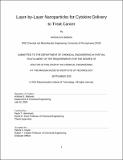Layer-by-layer nanoparticles for cytokine delivery to treat cancer
Author(s)
Barberio, Antonio Eric.
Download1227512739-MIT.pdf (9.230Mb)
Other Contributors
Massachusetts Institute of Technology. Department of Chemical Engineering.
Advisor
Paula T. Hammond.
Terms of use
Metadata
Show full item recordAbstract
Since the initial approval of checkpoint inhibition in 2011, immunotherapy has become an ever more present therapeutic strategy in the clinic and an increasingly large focal point in preclinical cancer research. Much of the success of immunotherapy in the clinic has focused on expanding indications of checkpoint inhibitors which "take the brakes off" the immune response to cancer. However, this strategy has seen limited success in many solid tumors, with only a small fraction of patients responding. One explanation for this phenomenon is a "cold" or poorly immune infiltrated tumor environment. An alternative strategy to utilize the immune system to fight the tumor in these cases is to deliver a proinflammatory agent such as a cytokine to drive immune infiltration and activity within the tumor environment, or "hitting the gas" on the cancer immunity cycle. Unfortunately, many proinflammatory cytokines, such as interleukin -12 (IL-12), that have been translated to the clinic have shown high, schedule dependent toxicity at relevant doses, making translation infeasible. One strategy to potentiate administration of therapies that are too toxic for systemic delivery is to use a nanoparticle delivery vehicle to concentrate the therapy within tumors and avoid off-target exposure. However, proinflammatory cytokines such as IL-12 pose unique design challenges for optimal delivery from a nanoparticle, including efficient encapsulation, subcellular targeting to cell surfaces to maintain activity on external receptors, and targeting to tumor cells to concentrate IL-12 in tumors and avoid systemic exposure. In this thesis we utilize the layer-by-layer (LbL) nanoparticle technique to adjust the material properties of a nanoparticle delivery vehicle to meet these design criteria. We demonstrate extensive in vitro and in vivo characterization of the designed LbL nanoparticles. We demonstrate reduced toxicity and enhanced efficacy of systemic IL-12 therapy from optimized LbL nanoparticles not only compared to carrier-free IL-12 but also compared to a simpler nanoparticle design that does not incorporate targeting polymer layers. Importantly, we demonstrate this effect in an orthotopic ovarian tumor model, a malignancy that has been particularly refractory to immunotherapies currently available in the clinic.
Description
Thesis: Ph. D., Massachusetts Institute of Technology, Department of Chemical Engineering, September, 2020 Cataloged from student-submitted PDF of thesis. Includes bibliographical references (pages 129-134).
Date issued
2020Department
Massachusetts Institute of Technology. Department of Chemical EngineeringPublisher
Massachusetts Institute of Technology
Keywords
Chemical Engineering.